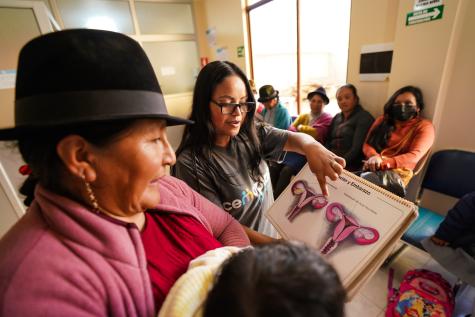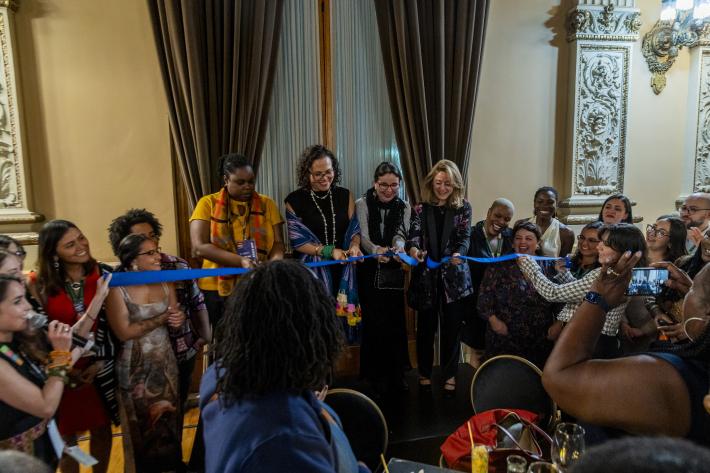
Spotlight
A selection of news from across the Federation

Americas & the Caribbean
Our Statement on the Reinstatement of the Global Gag Rule
The Global Gag Rule (GGR) violates our core principles, and IPPF cannot and will never sign it.
Filter our news by:


| 16 October 2024
Webinar | Transforming Stories into Policies
Transforming Stories into Policies: Advancing SRHR Advocacy in the Caribbean Click here to register Join us as we explore the pressing issue of adolescent pregnancies and the lived experiences of pregnant learners across the Caribbean. Through shared stories, innovative strategies, and expert insights, we’ll discuss how we can better support adolescent parents and turn their stories into meaningful policy change. 🤰🏽✨ This interactive session will feature presentations from experts across the region and highlight best practices to drive collective action. Let’s come together—advocates, educators, and policymakers—to shape a brighter future for our youth. 🌍 📅 Date: Tuesday, October 29, 2024 ⏰ Time: 10:30 am (Trinidad & Tobago Time) 📍 Platform: Zoom (Click here to register) Why attend? Understand the urgency of addressing adolescent pregnancies in the region. Learn about data-driven advocacy strategies that inspire real change. Discover best practices from experts on the frontlines of SRHR advocacy. We hope you can join us in this important conversation! Click here to register

| 07 October 2024
IPPF ACRO Opens New Regional Office in Mexico City
The International Planned Parenthood Federation in the Americas and the Caribbean (IPPF ACRO) celebrated the launch of its new regional office in Mexico City. This important step reaffirms IPPF's commitment to the region, adding to the existing office in Port of Spain, Trinidad and Tobago, to strengthen the articulation of the Membership and advance the sexual and reproductive rights agenda. IPPF has been present in the region for over 70 years, and these offices continue the commitment to providing sexual and reproductive health and rights to all people, regardless of their circumstances. The inauguration of the new office took place during the IPPF ACRO Regional Forum, with the full Americas & the Caribbean membership (30 organizations in 30 countries) present at the event. The launch included the participation of key allies and actors in the region, including organizations like UN Women, the Center for Reproductive Rights, IPAS LAC, Médecins Sans Frontières, Amnesty International, and Volcánicas, all of which have been instrumental in advancing our mission as a movement. Government representatives were also present, such as the Secretariat for Women of Mexico, the National Population Council, and the Ministry of Foreign Affairs, along with other governmental entities with which IPPF ACRO collaborates to ensure a comprehensive and committed approach to defending sexual and reproductive rights both in Mexico and throughout the region. This new office will not only facilitate better coordination between IPPF's member associations in the 30 countries of the region but also allow for closer ties with local actors, strengthened alliances, and coordinated strategy development in the realm of political advocacy. With a presence in Mexico City, IPPF ACRO will be able to participate more actively in key spaces, both nationally and regionally, expanding our capacity to advocate for access to sexual and reproductive health, bodily autonomy, and gender equality. The opening of the regional office in Mexico is a testament to the power of collaboration and unity in advancing our shared mission. With this new base in Mexico City, IPPF ACRO is more committed than ever to working alongside governments, civil society organizations, and our member associations to face threats to rights and ensure a dignified, violence-free life for all people in the region.

| 07 August 2024
Grenada Planned Parenthood Assocation provides SRHR in the aftermath of Hurricane Beryl
In the aftermath of Hurricane Beryl, the Grenada Planned Parenthood Association (GPPA) is committed to all people’s health and well-being. As the consequences of the hurricane might have disrupted access to essential services and basic needs, they continue to offer them in this humanitarian context. Here’s how they can help: Sexual and reproductive healthcare:They offer a range of confidential services, including Contraception, STI testing and counselling. Emergency contraception: Need Plan B? They can help. Prenatal care: They provide comprehensive prenatal care services to ensure the health of both mothers and babies. GPPA understands disasters can take a toll on Reproductive health. If you have any questions or need to schdule an appointment, call/message at 440-3341/ 403-3341

| 05 July 2024
5th RCPD: Civil Society Political Declaration
Haz click aquí para leer en español. Political Declaration of the Social Forum of Feminist networks, organizations and collectives at the Fifth Regional Conference on Population and Development Cartagena, Colombia, July 3rd 2024.- From a feminist, human rights, youth, anti-racist, anti-ableism and intersectionality perspective, it is essential to address the diverse and complex realities of all human groups without discrimination. The networks and organizations of feminist, indigenous, Afro- descendant, lesbian, transgender, youth, elderly, disabled, sex workers, women with HIV, all human rights defenders and committed to the fulfilment of the Program of Action of the United Nations International Conference on Population and Development (ICPD) and all international commitments emanating from it, we are present today to highlight: That the Montevideo Consensus has been a crucial framework for advancing the protection and promotion of human rights in our region. We have seen improvements in access to sexual and reproductive health, inclusive education and political participation of women and other historically marginalized groups. We especially recognize the advances in the legal frameworks that guarantee access to sexual and reproductive rights to transform them into public policies, as in the case of: decriminalization of abortion in some countries in the region, comprehensive sexuality education, gender parity, access to justice and protection in cases of gender-based violence, and budgets earmarked for exceptional cases. However, these advances are insufficient, do not cover historically excluded populations and have been implemented unevenly and slowly during these almost eleven years. In fact, setbacks and threats of loss of rights have been identified in many countries of the region. We are alarmed by the persistent inequality that exacerbates violence and the lack of access to rights. The prevalent conditions of violence against women, young people, adolescents and girls, in all their diversity, as well as against people with disabilities, both in the family and in the institutional sphere, are unacceptable. Download and read the full declaration here:

| 30 June 2024
June News Round-Up
Haz click aquí para leer este resumen de noticias en español. IPPF ACRO's June News Round-Up If you want to receive SRHR news directly from the ground to your inbox, subscribe to our newsletter Rising the Tide: Subscribe 🇧🇷 Brazil | Gestos joins protests against regressive abortion legislation On June 17th, Gestos, IPPF Collaborative Partner in Brazil, joined protests in Recife to express their deep indignation at the urgent approval of Bill 1904/2024, which equates legal abortion with homicide if performed after 22 weeks of gestation. For such a bill to pass to the plenary for a vote, without being analysed by the Commissions of the Chamber of Deputies, is a direct attack on the rights of all women, girls, and people who have abortions in Brazil. Read their statement in English, Spanish, Portuguese. 🇨🇱 Chile | APROFA joins the official delegation at the 30th anniversary of the Belem Do Pará Convention On June 11 and 12, at the ECLAC headquarters in Santiago de Chile, the 9th Conference of States Parties (CSP) of the Follow-up Mechanism of the Belém do Pará Convention (MESECVI) was held. This convention was the first to ever propose at an international level that violence against women is a violation of human rights. APROFA, IPPF Member Association, was appointed to participate in this event as part of the official Chilean delegation, along with other civil society organisations. During the conference, relevant topics for the visibility and promotion of women's rights were addressed, including gender-based violence against Afro-descendant women and access to justice, truth and reparation in Latin America. 🇬🇩 Grenada | Grenada Planned Parenthood Association’s (GPPA) Board President reflects on how Roe v. Wade's overturn impacted the Caribbean The United States Supreme Court overturned Roe V. Wade in June 24, 2022. The decision in Dobbs v. Jackson Women’s Health Organization ignited legislative efforts, demonstrations, and a multitude of legal challenges, making the issue a central political topic regionwide. Currently, abortion is prohibited at all stages of pregnancy, with only a few exceptions, in 14 states governed by Republicans. In three additional states, it is banned after roughly six weeks, often before many realize they are pregnant. Two years later, IPPF reached out to Dr. Tonia Frame, President of the Board of Directors at the Grenada Planned Parenthood Federation, to ask how Roe V. Wade’s overturn has impacted the Caribbean: “It appears that since the overturn of Roe v Wade, the abortion movement in the region has been revitalized. [...] Interestingly, Caribbean countries with stricter abortion laws are being challenged. [...] However, we recognize that we cannot remain complacent, as there has been a rise in the anti-abortion rhetoric and policies. In some Latin American countries, for example, Peru approved the “fetal personhood” bill, and in Honduras lawmakers increased the number of votes needed to repeal its abortion ban.” Read full interview in English and Spanish. 🇭🇹 Haiti | Women and girls are experiencing an alarming surge in sexual and gender-based violence The ongoing violence in Haiti is preventing access to essential sexual and reproductive healthcare services, endangering the lives of mothers and newborns. The Haiti Midwives Association, our partner in Haiti, has informed us, ‘the gangs prohibit the movement of motorcycles and pedestrians, threatening and sometimes shooting in the air to terrorise us further. Due to these difficult conditions, fewer and fewer patients are attending the hospital, whether for prenatal consultations, deliveries or postnatal care.” This inaccessibility has led to a significant increase in maternal and infant mortality. On the International Day for the Elimination of Sexual Violence in Conflict, IPPF shared a powerful statement to call for zero tolerance toward any form of SGBV, immediate protection of Haitian women, children, and those most at risk, as well as unhindered humanitarian access to allow aid into the country. Read full statement in English and Spanish. 🇭🇳 Honduras| Llaves shares powerful speech at UNAIDS Programme Coordinating Board Established in 1994, UNAIDS is guided by a Programme Coordinating Board (PCB). On June 27th, Keren Dunway represented Fundación Llaves, IPPF Collaborative Partner in Honduras, in the 54th UNAIDS PCB Meeting, where she participated in the panel A vision for a sustainable HIV response, analysing the role of youth-led organizations in HIV sustainability. “For the past 10 to 15 years, many organizations, including ours, have consistently issued an urgent call: The HIV response is only effective when communities lead,” she declared. “However, we cannot lead under the heavy uncertainty around sustainability. Many organizations are actively fighting to create policy change and meet the needs of people living with HIV while being under-resourced and without knowing if they will have the funding to continue next year. This is especially true for organizations of key populations, women-led organizations, and youth organizations.” Read more about her participation here. 🇲🇽 Mexico | Recent elections present a vital opportunity to centre SRHR On June 2nd, Claudia Sheinbaum was elected as the first female president in Mexico. As we watch how extreme-right groups make their way through high-level positions, IPPF ACRO shares our hope that this election represents an opportunity to renew efforts in advancing gender equality and sexual and reproductive rights. “The cultural shift happening in Mexico that has allowed a woman to be elected as president cannot go unnoticed,” said Eugenia López Uribe, IPPF ACRO Regional Director. “Indeed, it is not only a historic moment for Mexico, but for the region, an opportunity to face the anti-rights movements positioned in the highest government levels, and to react to them with human rights- based polices, programs and services.” Read the full text in English and Spanish. 🇱🇨 St. Lucia | St. Lucia’s Planned Parenthood Association’s (SLPPA) Youth Action Movement continues to expand menstrual management information to adolescents On June 13th, the St. Lucia’s Planned Parenthood Association’s Youth Action Movement (YAM) hosted a session for the students at a local Primary School. In partnership with the Marchand Public Library, the Youth Advocacy Movement held a session that covered an extensive overview of the menstruation process: the cycle, symptoms and how to manage it, as well as Period Bag Essentials. This activity was one of the many held by SLPPA’s YAM for infancies and adolescents, during the month of June. Across different Primary and Secondary schools, they continue to share a wealth of information, consultations, demonstrations and healthy living tips not only about menstruation, but on STIs, decision making, emotional awareness and other vital topics in Comprehensive Sexuality Education. 🌎 Regional Office | IPPF ACRO hosted the first of a series of sessions on Adolescent's Informal Unions in the Caribbean Given the relevance of addressing Child, Early, and Forced Marriages and Unions (CEFMU) in our region, IPPF ACRO has launched a series of webinars, “Adolescents’ Informal Unions in the Caribbean, to strengthen cross regional dialogue to promote comprehensive initiatives that put adolescents’ rights and autonomy at the centre. The first of these sessions commemorated the 30th anniversary of the Inter-American Convention on the Prevention, Punishment, and Eradication of Violence against Women, known as the Convention of Belém do Pará by analysing the situation of adolescent’s informal unions in the region and their link to discrimination and gender-based violence. As a keynote speaker, Dr. Gabrielle Hosein, researcher and academic from the Institute for Gender and Development Studies at the University of the West Indies, shared the research she conducted from 2021 to 2023 on Child Marriage and Early Unions in the Caribbean commissioned by UNICEF under the Spotlight Initiatives Caribbean Regional Programme. Read a summary of the session or watch the recording here. 🇻🇪 Venezuela | Members in Venezuela, Colombia, Peru and Ecuador respond to the Venezuelan humanitarian crisis To address the humanitarian crisis in Venezuela, IPPF together with Member Associations in Venezuela, Colombia, Peru and Ecuador, have been providing access to sexual and reproductive health for women, girls and people in transit. On June 19th, World Refugee Day marked the occasion to bring attention to the vital importance of emergency sexual and reproductive health services and call on governments to ensure women and girls safety and migration processes free of gender-based violence. Watch video in English and Spanish. If you want to receive SRHR news directly from the ground to your inbox, subscribe to our newsletter Rising the Tide: Subscribe

| 24 June 2024
Webinar | Adolescent Informal Unions in the Caribbean and Latin America: Challenges 30 Years After the Belem Do Para Convention
Haz click aquí para leer esta noticia en español. In Latin America and the Caribbean (LAC), one in five women marry or enter a union before the age of 18. This is the only region in the world where child marriage rates have hardly decreased over the past 25 years, and where informal unions without official registration are far more common than formal marriages. Given the relevance of addressing Child, Early, and Forced Marriages and Unions (CEFMU) in our region, IPPF ACRO has launched a series of webinars, “Informal Unions in the Caribbean and Latin America”, to strengthen cross regional dialogue to promote comprehensive initiatives that put adolescents’ rights and autonomy at the centre. The first of these sessions commemorated the 30th anniversary of the Inter-American Convention on the Prevention, Punishment, and Eradication of Violence against Women, known as the Convention of Belém do Pará by analysing the situation of adolescent’s informal unions in the region and their link to discrimination and gender-based violence. As a keynote speaker, Dr. Gabrielle Hosein, researcher and academic from the Institute for Gender and Development Studies at the University of the West Indies, shared the research she conducted from 2021 to 2023 on Child Marriage and Early Unions in the Caribbean commissioned by UNICEF under the Spotlight Initiatives Caribbean Regional Programme. A gender-based violence issue The Belém do Pará Convention is the main regional instrument to address violence against women as a violation of their human rights. Thirty years after the adoption, child marriages have been recognised as part of harmful practices, being both a cause and a consequence of gender-based violence against girls and adolescents. “It's still a challenge for all of us because despite all the commitments signed at the UN level, Child, Early, and Forced Marriages and Unions are still a barrier for many girls and young women, and it really has impeded their rights to be fulfilled,” Alessandra Nilo, IPPF ACRO’s External Relations Director, reflected when opening the session. Although these political commitments imply numerous intersectoral interventions – ensuring girls' access to education, sexual and reproductive health, and rights, ending gender stereotypes and gender-based violence, and ensuring equality before the law – government responses in the region have been limited mainly in raising the age of marriage to 18 years and eliminating exceptions. This response, although an important step, is insufficiently short in addressing the needs and situations that girls, adolescents and young women go through. Zooming in on the Caribbean context There is growing regional evidence about underlying drivers, manifestations and impacts of CEFMU on the girls who marry, as well as in their families and communities. However, there remains a large information gap on the situation in the Caribbean. At the end of 2023, Dr. Gabrielle Hosein published a research brief that summarises the information available on CEFMU in the Caribbean and complements it with findings of research commissioned by UNICEF in the framework of the Spotlight Initiative Caribbean Regional Program, conducted in six Caribbean countries. “It's really important in our region that we always keep the question of adolescent sexual agency in mind and adolescent agency overall, and that we don't simply think about adolescent girls as victims,” Dr. Hosein shared. “In our region, early unions, which are primarily informal, tend to be entered into by girls themselves. That is, girls are not being forced or married off into unions as they might be in other places or sold into unions in the same rates as in other places.” “None the less, girls are in disadvantage context, characterized by vulnerability, and they may enter unions for transactional exchange, for protection, to escape from family violence to secure support for their education and to experience intimacy.” In this research, Dr. Hosein and colleagues found clear intersectionalities that emerge from the data and point to the need to focus on the vulnerability these populations have been put in. Any approach needs to recognize these structural factors. Make sure you sign up to our newsletter to get information on the next webinars! Sign up here.
















